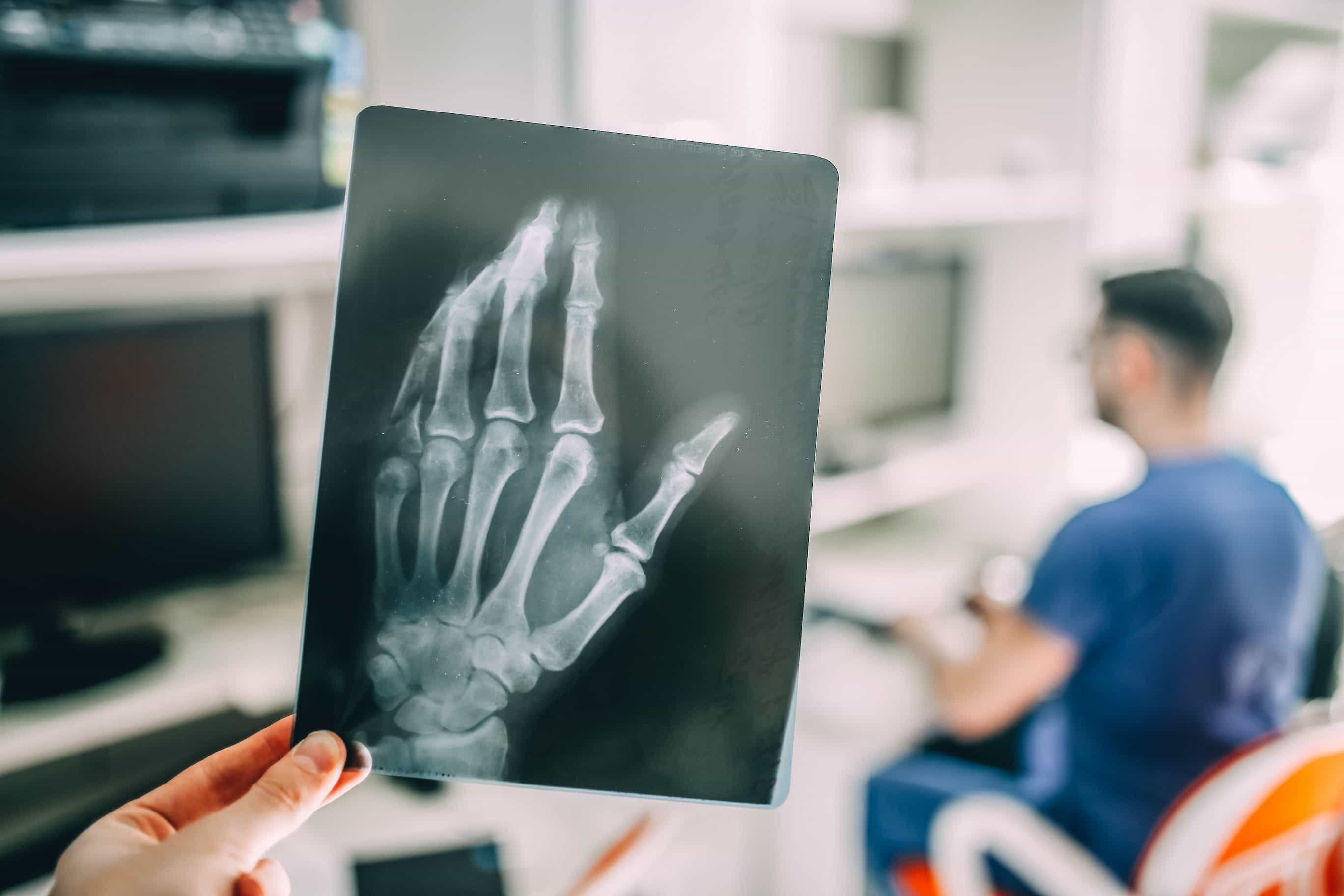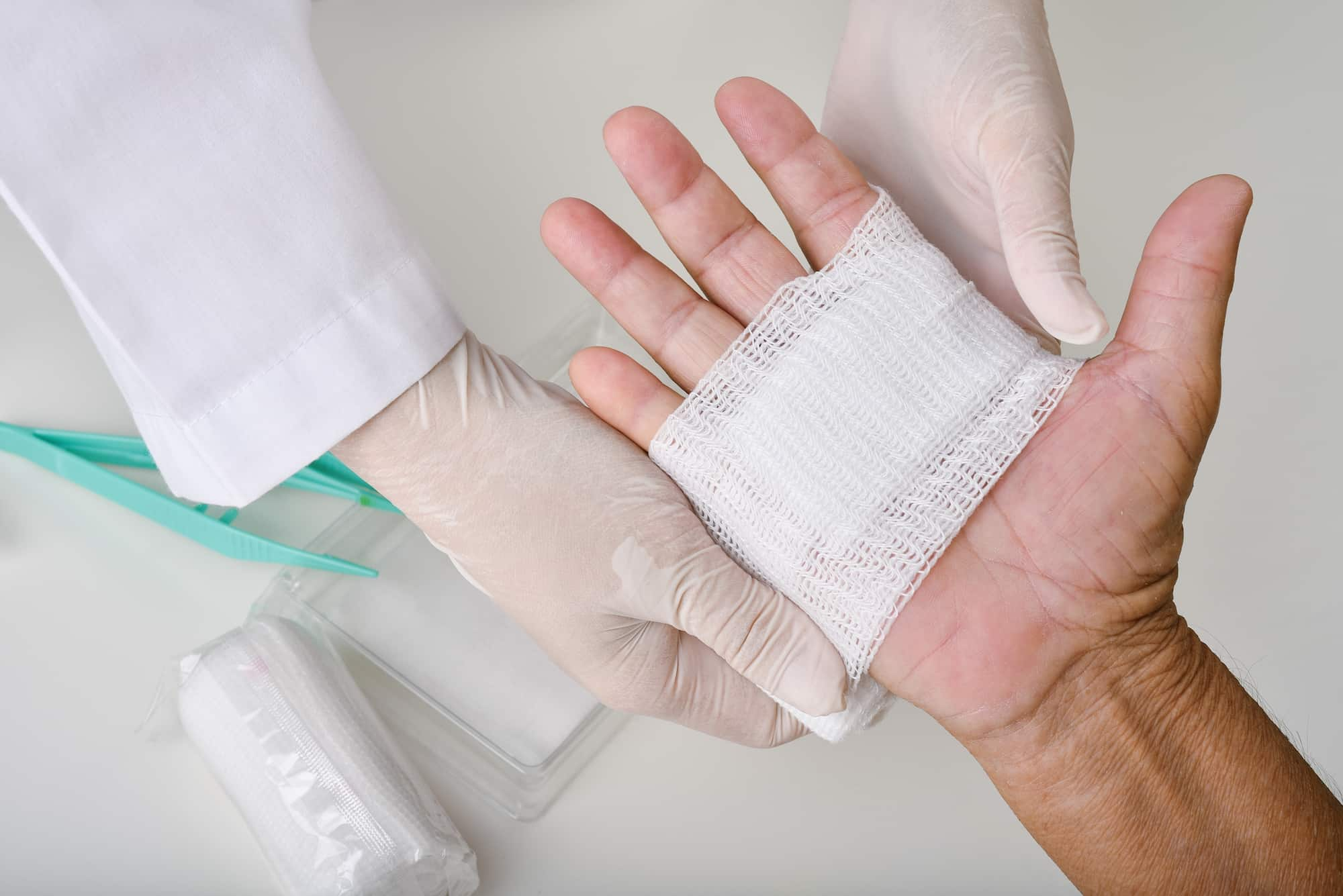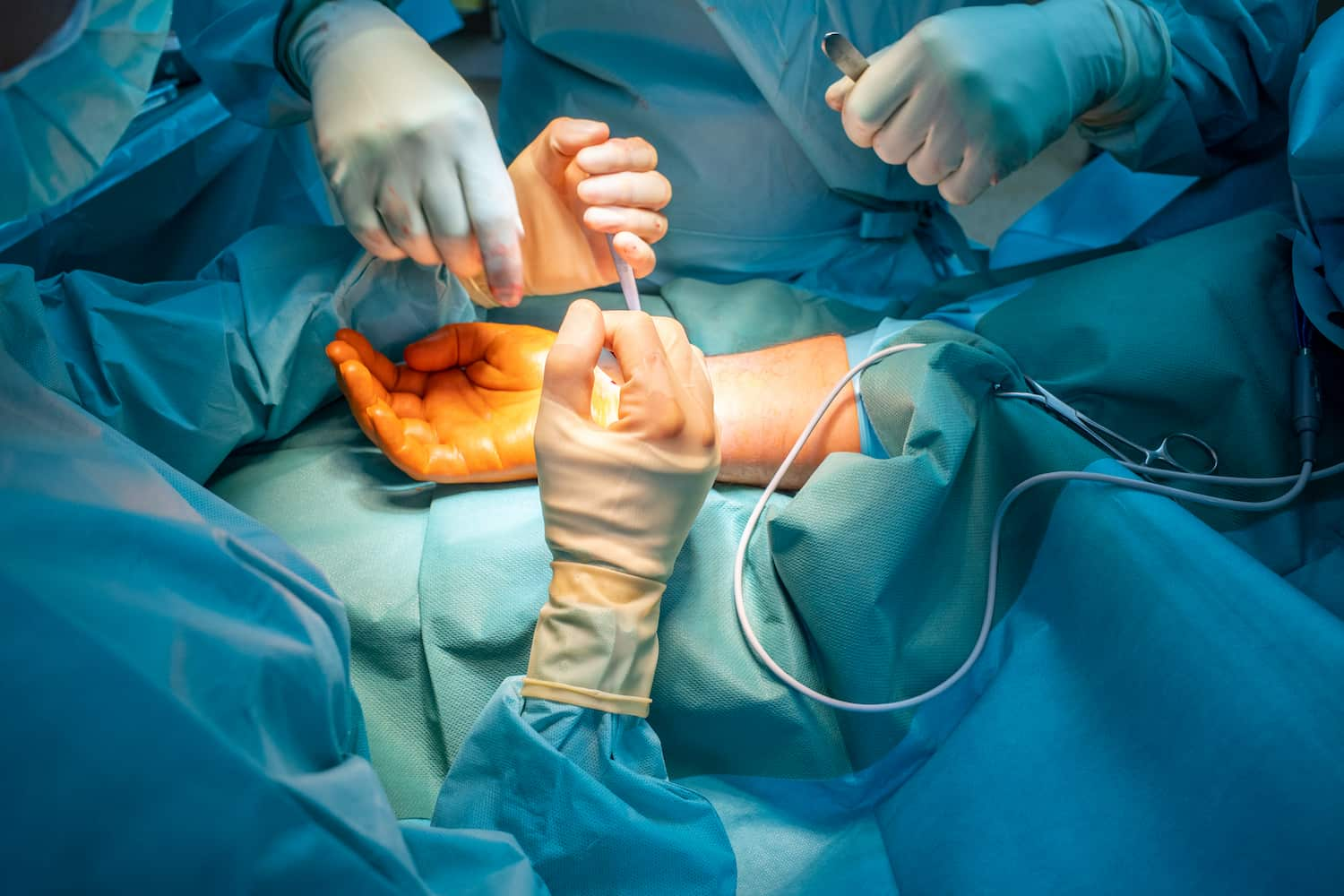Hand Surgery in Turkey
Hand surgery in Turkey ensures the highest standards of care, offering a comprehensive and safe solution for your health needs. Healthy Türkiye helps you find the best hand surgery in Turkey at affordable prices and adopts a 360-degree service approach in all areas of health through affiliated hospitals.
Get a Free Video-Call with Our Doctors
- Medical Treatment
- Breast Reduction in Turkey
- Buttock Augmentation in Turkey
- Chin Augmentation in Turkey
- Ear Plastic Surgery in Turkey
- Eyelid Surgery in Turkey
- Forehead Lift in Turkey
- Gynecomastia Surgery in Turkey
- Lip Enhancement in Turkey
- SmartLipo in Turkey
- Thigh Lift Surgery in Turkey
- Abdominal Etching in Turkey
- Brazilian Butt Lift in Turkey
- Breast Implants in Turkey
- Breast Lift in Turkey
- Buttock Implants in Turkey
- Dimpleplasty in Turkey
- Facelift in Turkey
- Labiaplasty in Turkey
- Liposuction in Turkey
- Neck Lift in Turkey
- Nipple Reduction Surgery in Turkey
- Breast Enlargement in Turkey
- Cheek Augmentation in Turkey
- Deep Plane Facelift in Turkey
- Calf Implant in Turkey
- Arm Lift Surgery in Turkey
- Chin Reduction Surgery in Turkey
- Facial Feminization Surgery in Turkey
- Hymenoplasty Surgery in Turkey
- LipoDissolve in Turkey
- Pectoral Implants in Turkey
- Pediatric Plastic Surgery in Turkey
- Reconstructive Plastic Surgery in Turkey
- Rhinoplasty in Turkey
- Tummy Tuck Surgery in Turkey
- Vaginoplasty in Turkey
- Varicose Vein Removal Surgery in Turkey
- Hand Surgery in Turkey
- Mommy Makeover in Turkey
- Sex Reassignment Surgery in Turkey
- Bichectomy in Turkey
- Plastic Surgery in Turkey
- Main
- Medical Treatment
- Hand Surgery in Turkey
- About Hand Surgery in Turkey
- What Is Hand Surgery in Turkey?
- What Does Hand Surgery Involve in Turkey?
- Diagnosis for Hand Surgery in Turkey
- Types of Hand Surgery in Turkey
- Carpal Tunnel Syndrome in Hand Surgery
- Cubital Tunnel Syndrome in Hand Surgery
- Thumb Arthritis in Hand Surgery
- Joint Replacements in Fingers
- Dupuytren’s Contracture in Hand Surgery
- Ganglions in Hand Surgery
- Breaks and Fractures of Hand Bones in Hand Surgery
- Wrist Pain in Hand Surgery
- Prepare for Hand Surgery in Turkey
- Recovery from Hand Surgery in Turkey
- 2024 Cost of Hand Surgery in Turkey
- Why Is Hand Surgery Cheaper in Turkey?
- Why Choose Turkey for Hand Surgery?
- Is Hand Surgery Safe in Turkey?
- All-Inclusive Packages for Hand Surgery in Turkey

About Hand Surgery in Turkey
Hand surgery in Turkey might be performed for various reasons, including infection of the hand, injury to the hand, or to correct long-term conditions affecting the hand. Surgery might be done on different parts of the hand, and it can be advised to correct either the bones or soft tissues in the hand. Hand surgery is generally performed by either an orthopedic surgeon, a general surgeon, or a plastic surgeon.
Hand surgery is a general term for various types of surgical procedures used to correct problems of the hand. The type of surgery conducted will depend on the particular hand issue, its location, and its severity. The recovery time will also depend on the type of hand surgery. Different kinds of hand surgeries involve surgery for arthritis, carpal tunnel release surgery, fracture repairs, reconstruction of tissue, and more.
Hand surgery surgeons in Turkey are renowned worldwide for their expertise and knowledge in their field. They work with a team involving other specialists and nurses to provide complete and effective treatment to their patients and ensure the best hand surgery care possible. Hand surgery surgeons in Turkey are highly qualified and educated, with degrees from the best national and international institutions. They ensure each and every patient receives the very best clinical services, including medical and surgical interventions based on their diagnosis.
These surgeons are skilled in the use of state-of-the-art devices and the latest techniques in hand surgery. Many of these surgeons have more or sub-specializations within the field of hand surgery and allow precise care for the patient’s case. The experienced surgeons in Turkey are pioneers who are included in the development of innovative methods and work for the betterment of healthcare in society.

What Is Hand Surgery in Turkey?
Hand surgery is surgery of the hand, the wrist, and the peripheral nerves of the upper limb in Turkey. It also includes reconstructive surgery, which improves the function of the upper extremities. Most disorders and injuries of the hand are treated without surgery, using splints, taping, injections, and hand physiotherapy. A general hand surgery operation is conducted as a day case under a regional anesthetic (injected in the armpit or above the shoulder, to numb the complete arm) while the patient is awake or lightly sedated, according to preference.
General anesthesia and/or overnight stay in the hospital are rare but are needed for some surgical operations on the hand, such as in children or when surgery is prolonged. A few surgical operations can be performed under local anesthesia (injected beneath the skin at the area of surgery). The specialist uses fine instruments to handle the delicate structures in the hand and might use magnifying glasses (loupes) or an operating microscope for the repair of the small nerves and arteries in the hand. Post-operative treatment by a hand therapist is necessary for optimal recovery after some types of hand surgery.
What Does Hand Surgery Involve in Turkey?
Surgery on the hand varies depending on the type of case it is attempting to correct. Many surgeries are conducted as minor day-case operations, meaning the patient can leave the hospital on the same day the surgical operation is performed. Some surgical operations are conducted under local anesthesia, meaning the patient is awake. Day-case surgical operations are generally preferred as they allow for quicker healing time.
Diagnosis for Hand Surgery in Turkey
The diagnosis of the hand will include taking the patient’s medical history. In addition, the diagnosing specialist might require the patient to perform some light exercises. This is significant in assessing the range of motion. It allows the specialist to determine which tendons and muscles are injured. In the case of injury, the specialist might order a wound culture. This is a requirement especially if the injury was due to a bite. It helps eliminate other diseases such as rabbis. The specialist also gently palpates the hand. This is in order to determine the extent of the injury; a broken bone is generally tender to touch.
Your specialist might also perform a needle prick test. The expert doctor will prick the hand at various points with a sterile needle to determine sensation. This test is conducted in order to determine if there has been any nerve damage.
Other tests that are conducted are an x-ray scan. In addition, a doppler flowmeter test can be performed. This test defines if there is any blood flow in the hand. It aids to determine if the tissues have been too badly affected and have begun dying off.

We Care About Your Health
Healthy Türkiye provides the best for your health and comfort. You will feel privileged with us.
7/24 Quality Personal Assistance Throughout Your Health Journey
Customizable for You All-Inclusive Treatment Packages
Get the Right Advice From Specialist Doctors and Health Consultants
Types of Hand Surgery in Turkey
Hand specialists in Turkey regularly perform surgical procedures on the hand and wrist. Most of these treatment procedures help relieve symptoms related to inflammation, injury, pain, or deformity. Other common surgeries repair nerves or tendons that are causing discomfort symptoms like pain or limited range of motion. If you’re experiencing any of these symptoms in your hand or wrist, you should contact hand surgery specialists at Healthy Türkiye to determine if you require one of these surgeries.
Carpal Tunnel Syndrome in Hand Surgery
Carpal tunnel syndrome begins when one of your main nerves, called the median nerve, becomes compressed in the wrist passageway, known as the carpal tunnel. The median nerve administers the sensation and movement of your hands, and when trapped, it causes hand pain, tingly hands, and hand clumsiness. The reason your median nerve becomes squeezed is generally not known, other than swollen tissues inside your carpal tunnel or narrowing of the tunnel. However, there are risk factors that increase your likelihood of having the syndrome.
These involve family history, pregnancy, hand injury, repetitive work, being female, and having medical conditions such as thyroid problems, diabetes, or rheumatoid arthritis. If your carpal tunnel syndrome is mild, non-surgical treatments such as a splint or steroid injection might relieve your symptoms. If these aren’t successful, or if permanent nerve damage is possible, surgery will be suggested. Carpal tunnel release surgery, also known as carpal tunnel decompression surgery, is a day-case surgical procedure performed under local anesthesia. It takes less than half an hour and includes your surgeon cutting your carpal tunnel roof to reduce the pressure on your median nerve.
Cubital Tunnel Syndrome in Hand Surgery
Cubital tunnel syndrome, or ulnar nerve entrapment, happens when your ulnar nerve begins trapped at your elbow. Initially, you might feel numbness and a tingly sensation in your ring and little fingers. This might develop into hand pain and weakness. You might feel these symptoms more if your elbows have been bent for long periods or if you’ve been leaning on your elbow.
Your specialist will apply a nerve conduction test to make a diagnosis. If your impulses are slow, this shows the nerve is compressed. Cubital tunnel surgery might be required to prevent permanent nerve damage. It is a day-case procedure carried out under general anesthesia, taking around an hour. This surgery will cut the roof of your cubital tunnel to release pressure on the ulnar nerve where it passes through this tunnel.
Thumb Arthritis in Hand Surgery
Thumb arthritis begins due to the trapezium bone in your wrist at the base of your thumb being affected by osteoarthritis (tear and wear). If you have thumb arthritis, you can feel pain where your thumb joins your wrist. It is generally first noticed when you knock or sprain your thumb or wrist. Thumb arthritis is more common in women aged 50 and above, but many men suffer from it too.
Your expert doctor will diagnose thumb arthritis based on their expertise and an x-ray. Initially, steroid injections are generally recommended to treat thumb arthritis. For long-term pain relief, thumb arthritis surgery such as a day-case procedure called trapeziectomy will be performed under general anesthesia. It takes around one hour and involves removing the trapezium bone.
Joint Replacements in Fingers
Osteoarthritis and rheumatoid arthritis might cause pain, swelling, and stiffness in your finger joints. Your specialist will make a diagnosis using an x-ray and their expert opinion. Joint replacement surgery is generally suggested to offer long-term pain relief for these painful joints. It’s a day-case surgical operation most frequently performed under local anesthesia. Surgery typically takes approximately 45 minutes for each joint. Your surgeon can replace several joints during one surgical operation. Your specialist might consider alternative treatments for arthritic joints, including steroid injections and surgical joint fusion.
Dupuytren’s Contracture in Hand Surgery
Dupuytren’s contracture creates when the skin in your palm and fingers becomes thickened and tight. It can advance and cause your fingers to be permanently bent and unable to fully straighten. Your expert doctor will be able to diagnose this disorder by sight and without any tests. There are a number of surgeries to treat this case, ranging from cutting a fibrous band in the palm of your hand to removing all of the affected skin and replacing it with skin grafts. Your expert doctor will suggest the most appropriate treatment based on the severity of your contracture.
Needle fasciotomy, an outpatient procedure, is most frequently performed for dupuytren’s contracture. It’s done under local anesthesia and includes dividing the thickened skin to release the tightness in your hand that’s forcing your finger to bend. Open fasciotomy is sometimes applied to treat more severe cases of Dupuytren’s contracture.
Ganglions in Hand Surgery
Ganglions are safe, fluid-filled cysts or lumps. They are usually found on your wrist or hand, and in particular on the back of your wrist or on your fingertips. It is not known why ganglia are formed. They might cause no symptoms, or they might be painful. Larger ganglions might be unsightly. Your hand specialist will be able to diagnose a ganglion by testing alone.
The most successful treatment for ganglion removal is a minimally invasive surgery called an excision. It’s performed as an outpatient procedure under local anesthesia and simply includes removing the ganglion. Unfortunately, ganglions can come back to the same site in the future.
Breaks and Fractures of Hand Bones in Hand Surgery
Hand bone breaks and fractures are general injuries that result in pain, swelling, stiffness, and reduced use of the injured hand. They are generally diagnosed by your hand surgeon’s evaluation and x-rays. Treatment options will depend on the diagnosis. It is best to treat a fracture within one week of the break. Many breaks and fractures of the hand bone are treated using a splint or cast. For fractures that require surgery, your hand surgeon will set your bone, and keep it together using miniature plates, screws, pins, and wires. The bone setting should take around three weeks and be up to full strength after three to four months.
Wrist Pain in Hand Surgery
Wrist pain is general. It might happen spontaneously or because of an old or new injury, and can be due to issues in your bones, tendons, ligaments, and nerves in your wrist. Generally, multifaceted investigations are necessary to accurately diagnose wrist pain. These involve X-rays, MRI scans, CT scans, ultrasound, arthroscopy, and nerve conduction tests.
Once your hand specialist understands the cause of your wrist pain they can suggest appropriate treatment. Healthy Türkiye offers direct access to a hand specialist and comprehensive high-quality diagnostic services to allow rapid diagnosis of your wrist pain. Your hand specialist will suggest the best treatment for your individual wrist complaint.
Prepare for Hand Surgery in Turkey
Before the hand surgery in turkey, you will be asked to sign a consent form, which gives your surgeon permission to carry out the treatment. It’s significant to ask any questions you might still have at this stage. Ask your specialist, nurse or therapist to explain anything you don’t understand. You should also discuss with your surgeon at Healthy Türkiye, an anesthetist or a nurse at the pre-admission clinic whether you should stop taking any of your medicines or make any changes to the dosage or timing before you have your hand surgery. Different units might have different recommendations. A specialist or nurse will check your general health to make sure there won’t be problems with a general anesthetic if this is being applied.
You should have a dental check-up and get any issues dealt with well before your hand surgery. There’s a risk of infection if bacteria from dental issues get into the bloodstream. You might need to wear splints after the operation, which can make everyday tasks difficult. It’s a good idea to make preparations before the hand surgery. Simple things like choosing clothes with wide arms, stocking up your freezer or arranging to have some aid in your home will all make it easier to manage one-handed. Since you will probably need to go to the hospital regularly to see your specialist or therapist, your personal assistant, whom we have provided for you, will help you with transportation. Your occupational therapist will be able to advise you before your hand surgery if you have any concerns about coping at home afterwards.
Recovery from Hand Surgery in Turkey
This will depend on the type of surgical operation and your general health. Ask your expert doctor what you should expect after the operation. Planning ahead can make it easier to administer when you back home. Different expert doctors have different ideas about the treatment required after hand surgery. This is affected by the type of surgery and your health. You might need to wear splints to protect the healing tissues and bone, but you should discuss with your surgeon what to expect after the hand surgery. Your nurse, occupational therapist, physiotherapist, or hand therapist at Healthy Türkiye will be able to provide support.
After you have been discharged from the hospital or clinic an appointment will be made for you to come in as an outpatient to check your progress. Sometimes your specialist will help with this aftercare. A district nurse or practice nurse might be asked to remove stitches and change dressings. If you stopped taking any of your regular medications or had to alter the dose before the hand surgery, it’s very important to talk to your rheumatologist for advice on when you should restart your drugs.
After Hand Surgery in Turkey
After you have been discharged from the hospital or clinic an appointment will be made for you to come in as an outpatient to check your progress. Sometimes your specialist will help with this aftercare. A district nurse or practice nurse might be asked to remove stitches and change dressings. If you stopped taking any of your regular medications or had to alter the dose before the hand surgery, it’s very important to talk to your rheumatologist for advice on when you should restart your drugs.

2024 Cost of Hand Surgery in Turkey
All types of medical attention, like hand surgery, are very affordable in Turkey. Many factors are also included in determining the cost of hand surgery in Turkey. Your process with Healthy Türkiye will last from the time you decide to have hand surgery in Turkey until the time you are fully recovered, even if you are back home. The exact cost of a hand surgery procedure in Turkey depends on the type of operation involved.
The cost of hand surgery in Turkey does not demonstrate many variations in 2024. Compared to costs in developed countries like the United States or the UK, hand surgery costs in Turkey are relatively low. So, it’s no wonder patients from across the world visit Turkey for hand surgery procedures. However, price is not the only factor affecting choices. We suggest looking for hospitals that are safe and have hand surgery reviews on Google. When people decide to seek medical help for hand surgery, they will not only have low-cost procedures in Turkey but also the safest and best treatment.
At clinics or hospitals contracted with Healthy Türkiye, patients will receive the best hand surgery from specialist doctors in Turkey at affordable rates. Healthy Türkiye teams provide medical attention, hand surgery procedures, and high-quality treatment to patients at a minimum cost. When you contact Healthy Türkiye assistants, you can get free information about the cost of hand surgery in Turkey and what this cost covers.
The price of hand surgery in the UK is in the range of £4.500-£6.500.
The price of hand surgery in the USA is around $9.000-$15.000.
The price of hand surgery in Turkey is approximately $1.500-$2.500.
Price of Hand Surgery in the UK
Price of Hand Surgery in the USA
Price of Hand Surgery in Turkey
Why Is Hand Surgery Cheaper in Turkey?
One of the main considerations before traveling abroad for hand surgery is the cost-effectiveness of the whole process. Many patients think that when they add flight tickets and hotel expenses to their hand surgery costs, it will become very expensive to travel, which is not true. Contrary to popular belief, round-trip flight tickets to Turkey for hand surgery can be booked very affordably.
In this case, assuming you are staying in Turkey for your hand surgery, your total travel expense of flight tickets and accommodation will only cost less than any other developed country, which is nothing compared to the amount that you are saving. The question “Why is hand surgery cheaper in Turkey?” is so common among patients or people simply curious about getting their medical treatment in Turkey. When it comes to hand surgery prices in Turkey, there are 3 factors allowing for cheaper prices:
The currency exchange is favorable for whoever looking for hand surgery has a euro, dollar, or pound;
The lower cost of living and cheaper overall medical expenses such as hand surgery;
For hand surgery, incentives are given by the Turkish Government to medical clinics working with international clients;
All these factors allow for cheaper hand surgery prices, but let’s be clear, these prices are cheaper for people with strong currencies (as we said, euro, dollar, Canadian dollar, pound, etc).
Every year, thousands of patients from all over the world come to Turkey to get hand surgery. The success of the healthcare system has increased in recent years, especially for hand surgery. It’s easy to find well-educated and English-speaking medical professionals in Turkey for all kinds of medical treatment, such as hand surgery.

Why Choose Turkey for Hand Surgery?
Turkey is a common choice among international patients seeking advanced hand surgery. Turkey’s health procedures are safe and effective, with a high success rate, like hand surgery. The increasing demand for high-quality hand surgery at affordable prices has made Turkey a popular medical travel destination. In Turkey, hand surgery is performed by highly experienced and trained doctors with the most advanced technology in the world. Hand surgery is done in Istanbul, Ankara, Antalya, and other major cities. The reasons for choosing hand surgery in Turkey are as follows:
High-quality hospitals: Joint Commission International (JCI) accredited hospitals have dedicated hand surgery units that are specially designed for patients. International and national strict protocols provide effective and successful hand surgery for patients in Turkey.
Qualified experts: The expert teams include nurses and specialist doctors, together to carry out hand surgery according to the patient’s needs. All the included doctors are highly experienced in performing hand surgery.
Affordable price: The cost of hand surgery in Turkey is affordable compared to Europe, the USA, the UK, Singapore, Australia, etc.
The high success rate: Highly experienced specialists, the best available technology, and stringently followed safety guidelines for post-operative care of the patient, resulting in a high success rate for hand surgery in Turkey.
A recent comprehensive study conducted at a leading medical institution in Turkey delved into the outcomes of various hand surgery procedures, comparing the effectiveness of interventions such as carpal tunnel release surgery, fracture repairs, and tissue reconstruction. The research, spanning a diverse patient population with different hand issues, provided valuable insights into the optimal surgical approaches for specific conditions, enhancing the reliability and precision of hand surgeries in Turkey.
Is Hand Surgery Safe in Turkey?
Did you know Turkey is one of the most visited destinations for hand surgery in the world? It is ranked as one of the most popular tourist destinations for hand surgery. Over the years, it has also come to be a very popular medical tourism destination, with many tourists coming in for hand surgery. There are so many reasons why Turkey stands out as a leading destination for hand surgery. Because Turkey is both safe and easy to travel to, with a regional airport hub and flight connections to pretty much everywhere, it is preferred for hand surgery.
The best hospitals in Turkey have experienced medical staff and specialists who have performed thousands of medical services, such as hand surgery. All procedures and coordination related to hand surgery are controlled by the Ministry of Health in accordance with the law. Over many years, the greatest progress in medicine has been observed in the field of hand surgery. Turkey is known among foreign patients for its great opportunities in the area of hand surgery.
To emphasize, besides the price itself, the key factor in selecting a destination for hand surgery is certainly the standard of medical services, the hospital staff’s high level of expertise, hospitality, and the safety of the country.
All-Inclusive Packages for Hand Surgery in Turkey
Healthy Türkiye offers all-inclusive packages for hand surgery in Turkey at much lower prices. Extremely professional and experienced doctors and technicians carry out high-quality hand surgery. The cost of hand surgery in European countries can be quite expensive, especially in the UK. Healthy Türkiye provides cheap all-inclusive packages for a long and short stay of hand surgery in Turkey. Because of many factors, we can provide you with many opportunities for your hand surgery in Turkey.
The price of hand surgery differs from other countries due to medical fees, staff labor prices, exchange rates, and market competition. You can save much more on hand surgery in Turkey compared to other countries. When you purchase a hand surgery all-inclusive package with Healthy Türkiye, our healthcare team will present hotels for you to choose from. In hand surgery travel, you will have the price of your stay included in the all-inclusive package cost.
In Turkey, when you purchase hand surgery all-inclusive packages through Healthy Türkiye, you will always receive VIP transfers. These are provided by Healthy Türkiye, which has contracted with highly qualified hospitals for hand surgery in Turkey. The Healthy Türkiye teams will organize everything about hand surgery for you and have you picked up from the airport and safely brought to your accommodation. Once settled in the hotel, you will be transferred to and from the clinic or hospital for hand surgery. After your hand surgery has been successfully completed, the transfer team will return you to the airport in time for your flight home. In Turkey, all packages of hand surgery can be arranged upon request, which relaxes the minds of our patients. You can reach out Healthy Türkiye for everything you need to know about hand surgery in Turkey.
Frequently Asked Questions
You should not use the hand too much and too early after hand surgery. And should not use the hand at all after a surgical operation. This generally results in problems with stiffness. You should elevate the hand as advised to minimize swelling and improve healing.
You should remember not to eat or drink anything after midnight prior to your hand surgery, or as directed by your anesthesiologist. This involves drinking water, using breath mints, and even chewing gum. Having food in your stomach can create a risk during hand surgery.
Healing from hand surgery will take six to eight weeks. This whole time, you might need to regularly visit your specialist to ensure that the recovery process goes as planned. Besides expert doctor visits, painkillers are an essential part of recovery.
A hand surgery patient should expect a recovery period of several weeks or months, depending on the complexity of the hand surgery and their body’s capacity to heal. During recovery, hand surgery patients should refrain from using their hands in any manner not approved by their surgeon.
48 hours after hand surgery, surgical wounds can get wet without increasing the risk of infection. After this time, you can get your stitches wet briefly with a light spray, but they should not be soaked (for example, in the bath). Make sure you let the part dry afterward.
Many surgeries, like hand surgery, require a short period of protection to allow your body to begin its recovery from your procedure. When you leave the surgery, your hand, wrist, or forearm might be wrapped with a bulky dressing. Surgeons will often include a splint as part of the dressing.
It is common to experience some discomfort after hand surgery, but it is unusual for this to be unpleasant. You will be delivered with a number of different pain-killing medications of varying strength depending upon the type of surgery you have had. In the first 48 hours, it is generally better to take this medication regularly.
Your expert doctor might tell you whether you can or cannot drive. However, it is the patient who decides whether it is safe to drive or not. In making this decision, you must consider whether you are in full and complete control of the vehicle and able to react appropriately in an emergency.
In many operations, dissolving stitches are used, which means they do not need removal. If stitches are used that need removal, this can be done by either the hospital or your special practice.
